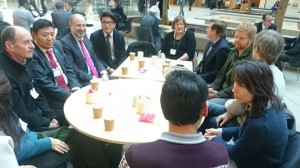Tibet on the EU Agenda
The 33rd round of the EU-China Dialogue on Human Rights took place in the European Parliament in Brussels on December 8. Among the major points of discussion, the foremost was the denial of human rights in Tibet. Other topics discussed were: the right of minorities, especially in Tibet and Xinjiang; freedom of religion or belief, freedom of expression, freedom of peaceful assembly and association; the due process of law; arbitrary detention; the condition of Tibetan political prisoners and the death penalty. The EU officials also brought up the imprisonment of Tenzin Delek Rinpoche, Uyghur scholar Ilham Tohti, the Mongolian activist Hada, Nobel Laureate Liu Xiabo, Gao Yu, Pu Zhiqiang, Xu Zhiyong, and Gao Zhisheng.
A press statement issued by EU at the end of meeting said that the dialogue allowed the two sides to have a detailed exchange of views on a wide range of human rights issues.
What has been of particular disappointment to Tibet supporters in the EU was the recent non-renewal of the Tibet Intergroup. Founded in 1989, the Intergroup has been an important base of support for Tibet within the EU. Despite intensive lobbying by Tibet supporters across the EU, and the approval of individual MEPs the Intergroup was not renewed. This decision followed lobbying by the Chinese government, which sent a letter to MEPs saying that it was “very concerned” about the re-establishment of the group and repeating Chinese propaganda.
British Parliamentary Debate Discusses Tibet
In the UK, after months of requests by British Tibet support groups, a parliamentary debate on Tibet was agreed by the Office of the Speaker of the House of Commons and took place on December 10 – Human Rights Day, as well as coinciding with the EU-China Dialogue on Human Rights in Brussels. It was noteworthy as the first debate specifically about Tibet in the British Parliament since 2011, and only the second since 2008.
The debate, entitled “Tibet and Freedom of Expression” was opened and led by MP Fabian Hamilton, the Chair of the All Party Parliamentary Group for Tibet, who called on the UK government “to challenge China’s policies in Tibet, in particular where the Chinese government is flouting international standards on human rights and civil liberties”.
In his speech, Hamilton said, “There is no doubt that the Chinese government uses a mix of systematic oppressive measures, propaganda and disinformation to stifle free expression and to present a positive image of their actions in Tibet to the outside world.” He also highlighted the ongoing cases of political prisoner Tenzin Delek Rinpoche and imprisoned Tibetan musicians Lolo, Kalsang Yarphel and Pema Rigzin.
MP Tim Loughton stated that “the climate within the Tibetan autonomous region can be likened to that of a military occupation”. He asked UK to be a “critical friend” of China, and stressed the need for “transparency of dialogue” with the latter.
MP Kate Hoey asked, “What dreadful thing would the Chinese government have to do in order for our government to start standing up to China?”
Martin Horwood noted that the Tibetans’ peaceful approach to seeking a solution continues to be “met with incredibly aggressive language and a heavy-handed and oppressive response from the Chinese authorities”.
MP Kerry McCarthy called on the government to raise Tibet as an issue of concern in all forms of engagement with China, saying the government needs a “more strategic engagement that allows the UK to raise human rights concerns and to meet the Dalai Lama without fear of being frozen out”.
Foreign Minister Hugo Swire responded by acknowledging that the issue of Tibet deserved more attention and suggested a further debate. He also confirmed that the case of Tenzin Delek Rinpoche had been raised with Beijing. However, he emphasised the government’s policy of recognising Tibet as part of the People’s Republic of China, adding, “We do not support Tibetan independence”.
Following the debate, Hamilton met Tibetans and supporters who were in attendance and aired their frustration at the government’s response, calling it “weak” and an “exercise in PR”. A spokesperson for The Tibet Society, a Tibet support group based in London, UK, said that the Government had offered no indication if it was willing to take a more robust approach on Tibet and human rights, and “worryingly seemed to use language that would appease, or even pander to, the Chinese government.”







 Print
Print Email
Email